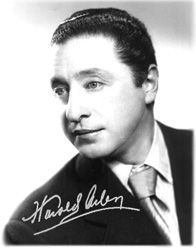(1905 - 1986) - a biography
Born Hyman Arluck 1905 in Buffalo, New York, music was always at
the centre of Arlen's life. At seven, he sang in the choir of the
synagogue where his father was cantor, and his family arranged for
him to take piano lessons in the hope that he'd become a music teacher.
By the time he had graduated from Hutchinson High School in Buffalo,
however, Harold had developed a passion for ragtime.
 Hot Licks, Golden Tonsils Hot Licks, Golden Tonsils
By the age of 12, Arlen explains that: "My big interest was in the jazz
instrumentation of the day." At 15, he was playing professionally in Buffalo.
Later, he joined The Buffalodians, progressing through smart restaurants
to Manhattan clubs. Arlen was soon noted for his pianistic 'hot licks'
and serviceable voice.
In 1928, he was chosen to perform a song in George Whites Scandals, a
popular revue of the day. Arlen's ambition to become a singer, though,
was dispelled when he was turned down for a vocal spot in the show Great
Day! At a party for the show, however, composer Harry Warren heard Arlen
play about with a musical idea at the piano and introduced him to lyricist
Ted Koehler. When Koehler put words to the tune, it became the hit song
'Get Happy'.
The Cotton Club
The main reason for Arlen's comparatively low profile as a popular composer
lies in his predilection for socially conscious material. At a time when
much of popular entertainment was escapist, he did not hesitate to take
chances. His first step in
this direction was when, between 1930 and 1934, he composed a string
of hit songs for revues at Harlem's Cotton Club: Soulful classics such
as 'Ill Wind', 'I've Got a Right to Sing the Blues' and 'Between the Devil
and the Deep Blue Sea'.
One of the numbers - 'Stormy Weather' - rocketed him abruptly into the
top rank of Thirties composers. It was sung one night by the great Ethel
Waters, backed by the Duke Ellington Orchestra, and created a sensation.
It revealed that Arlen had gone even further than George Gershwin - always
his greatest influence - in developing a style of American popular music
combining European modes with black influences (jazz rhythms and bluesy
soulfulness).
Arlen and Harburg
Arlen had already written the odd film and stage-show song with Yip Harburg,
but their finest hour was in 1939. MGM's The Wizard of Oz gave
them one of their most enduring hits in 'Over the Rainbow', a song which
became intimately connected with Judy Garland. Later, in 1954, Arlen provided
a more adult theme song for her in Warner's A Star Is Born - the
classic torch song 'The Man That Got away', with lyrics by Ira Gershwin.
Although he settled for some time in Beverly Hills with his wife Anya
(a former showgirl) it was on Broadway that Arlen was able to develop
his ideas fully. There was an anti-war satire (Hooray For What! - 1937),
a celebration of early feminism (Bloomer
Girl, 1944), and various black subjects (St. Louis Woman - 1946: House of Flowers - 1954: Jamaica, 1957)
With progressive attitudes of his own, Harburg quickly proved Arlen's
most sympathetic collaborator, working with him on Hooray, Bloomer and Jamaica. As a tribute to Arlen's style of music and sympathy
for black people, Ethel Waters once called him 'the Negro-ist white man'
she had known.
|
 Hot Licks, Golden Tonsils
Hot Licks, Golden Tonsils